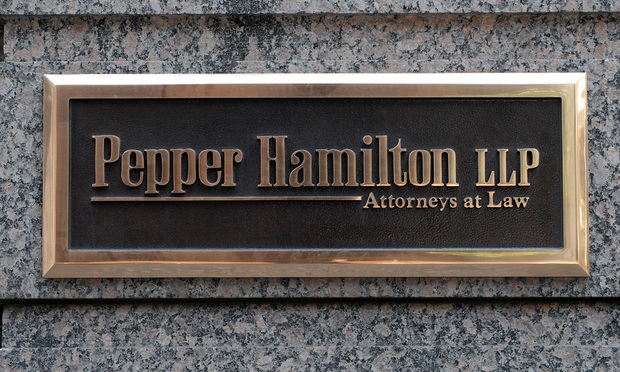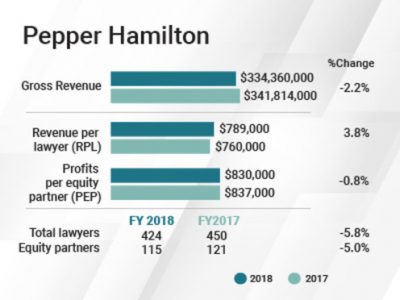A 'Different Firm,' Pepper Hamilton Posts Declines in Revenue, Profits
The firm attributed the declines to right-sizing revenue with head count, citing an uptick in revenue per lawyer.
February 25, 2019 at 05:30 AM
6 minute read
The original version of this story was published on The Legal Intelligencer
 Pepper Hamilton.
Pepper Hamilton.
Though it shrank in size for the third year in a row, Pepper Hamilton called 2018 a success, pointing to its goal of increasing per-lawyer productivity.
The Philadelphia-based firm saw gross revenue decline by 2.2 percent, to $334.36 million. But on a lower head count, its revenue per lawyer (RPL) increased by 3.8 percent, to $789,000.
Managing partner Thomas Cole said that RPL is a record high for the firm.
“We're a little different firm than we were a few years back,” Cole said. “Our revenue and head count is much better matched now.”
Profits per equity partner (PEP), at $830,000, showed a decline of 0.8 percent, as net income decreased by 5.8 percent, to $95.45 million.
 The firm increased rates by about 3 to 3.5 percent for the most part, Cole said, though the average rate increase was likely lower, in the 2 percent range, because of the smaller increases at the associate level. Realization improved by about 1 percent, he said, “an indication that we got the rate increase right.”
The firm increased rates by about 3 to 3.5 percent for the most part, Cole said, though the average rate increase was likely lower, in the 2 percent range, because of the smaller increases at the associate level. Realization improved by about 1 percent, he said, “an indication that we got the rate increase right.”
About 14 percent of the firm's revenue comes in on an alternative fee basis. Gallagher said there's been no uptick recently, but Pepper has had a pricing team in place since 2012. “We were early in the game for fixed fees” because of the firm's pharmaceutical-industry background, Cole said.
The 115-person equity partnership was smaller by six lawyers in 2018, compared to 2017. And the nonequity tier shrank by 6 percent, to 78 lawyers. Overall head count also declined, by 5.8 percent, from 450 in 2017 to 424 in 2018.
It was the third straight year of head count declines for Pepper Hamilton as well. Before that, in 2015 the firm had its best year in terms of PEP, surpassing $1 million for that metric.
But departures in 2018 were budgeted for, Cole said. They included some retirements, as well as some associates who went in-house with clients. The latter “was welcome news,” chairman Thomas Gallagher said.
One lawyer who went in-house was Shirley Kuhlmann, who took a position at Collegium Pharmaceutical Inc. after serving as its outside counsel at Pepper.
Still, several Pepper lawyers made lateral moves to other large firms. Early in the year, the firm saw three litigators join Blank Rome in Philadelphia and Pittsburgh, including a former federal judge who had been planning to retire before switching gears and joining Blank Rome instead. The head of Pepper's alcoholic beverage industry group made a move to DLA Piper, seeking an international platform. And a co-chairman of the firm's securities and financial services enforcement group headed West from Pepper's Washington, D.C., location to Snell & Wilmer's Salt Lake City outpost.
But Pepper made its own additions as well, completing 11 lateral hires in 2018, the firm said, as it aimed to grow outside Philadelphia.
They included two white-collar defense partners in Boston who joined the health sciences department—former assistant U.S. attorney Miranda Hooker, and Callan Stein, who had been at law firm Barrett & Singal. The firm also made several IP partner hires; added a duo of transactional partners and a securities litigator in Orange County, California, from three different firms; and brought on an employee benefits and executive compensation partner in New York from midsize firm Morrison Cohen.
A group hire of two dozen IP professionals in Rochester and a new office there, which Pepper officially brought on this month, was in the works throughout the second half of 2018. But the related expense did not hit the firm's budget until this year, Cole said.
Turning from key hires to key engagements, Cole noted that the firm represented the White House Correspondents' Association in its support of CNN reporter Jim Acosta when his press pass was suspended; argued on behalf of New Mexico Health Connections in a challenge to the federal government's risk adjustment formula, involving $10 billion in risk adjustment payments; and represented another Philadelphia-based large law firm, Duane Morris, in a $625 million malpractice suit where Pennsylvania appellate courts affirmed dismissal of the claims in 2018.
The firm said it closed more than 90 deals in 2018, with a total of more than $10.5 billion in deal value, though Cole noted that some of the fees for those transactions came in 2019.
Evolving Industries
Asked how the firm is different in 2019 from the middle of the decade, Cole and Gallagher noted the creation of Pepper Hamilton's multipractice health sciences department, formed in 2017. That combined its health effects litigation group, which had been a marquee practice, with other services for health care industry clients, such as IP and white-collar defense.
In the past, Cole said, more of the firm's revenue could be traced to a small group of “behemoth” clients. Those clients still turn to Pepper for significant matters, he said, but not for every legal need.
“All of those folks working collaboratively and together have replaced that revenue,” Cole said, referring to the health sciences department.
“The industry we serve changed dramatically,” Gallagher added. “We've changed because the industry we serve has changed.”
As for 2019, Cole said the firm is aiming to grow RPL at a better rate than the average for the Am Law 50 to 100. “The addition of Rochester will be a nice boost,” he noted.
If there is any downturn in the economy, he said, the firm has no debt and well-balanced practices to see it through.
“We're cautiously optimistic,” Cole said.
Read More
Pepper Hamilton Grows in Rochester, Taking Over LeClairRyan's Office Space
Pepper Hamilton Revenue Down 1.7 Percent, PPP Up 14.3 Percent
This content has been archived. It is available through our partners, LexisNexis® and Bloomberg Law.
To view this content, please continue to their sites.
Not a Lexis Subscriber?
Subscribe Now
Not a Bloomberg Law Subscriber?
Subscribe Now
NOT FOR REPRINT
© 2025 ALM Global, LLC, All Rights Reserved. Request academic re-use from www.copyright.com. All other uses, submit a request to [email protected]. For more information visit Asset & Logo Licensing.
You Might Like
View All

Three Akin Sports Lawyers Jump to Employment Firm Littler Mendelson

Brownstein Adds Former Interior Secretary, Offering 'Strategic Counsel' During New Trump Term
2 minute read
Trending Stories
- 1Pa. High Court: Concrete Proof Not Needed to Weigh Grounds for Preliminary Injunction Order
- 2'Something Else Is Coming': DOGE Established, but With Limited Scope
- 3Polsinelli Picks Up Corporate Health Care Partner From Greenberg Traurig in LA
- 4Kirkland Lands in Phila., but Rate Pressure May Limit the High-Flying Firm's Growth Prospects
- 5Davis Wright Tremaine Turns to Gen AI To Teach Its Associates Legal Writing
Who Got The Work
J. Brugh Lower of Gibbons has entered an appearance for industrial equipment supplier Devco Corporation in a pending trademark infringement lawsuit. The suit, accusing the defendant of selling knock-off Graco products, was filed Dec. 18 in New Jersey District Court by Rivkin Radler on behalf of Graco Inc. and Graco Minnesota. The case, assigned to U.S. District Judge Zahid N. Quraishi, is 3:24-cv-11294, Graco Inc. et al v. Devco Corporation.
Who Got The Work
Rebecca Maller-Stein and Kent A. Yalowitz of Arnold & Porter Kaye Scholer have entered their appearances for Hanaco Venture Capital and its executives, Lior Prosor and David Frankel, in a pending securities lawsuit. The action, filed on Dec. 24 in New York Southern District Court by Zell, Aron & Co. on behalf of Goldeneye Advisors, accuses the defendants of negligently and fraudulently managing the plaintiff's $1 million investment. The case, assigned to U.S. District Judge Vernon S. Broderick, is 1:24-cv-09918, Goldeneye Advisors, LLC v. Hanaco Venture Capital, Ltd. et al.
Who Got The Work
Attorneys from A&O Shearman has stepped in as defense counsel for Toronto-Dominion Bank and other defendants in a pending securities class action. The suit, filed Dec. 11 in New York Southern District Court by Bleichmar Fonti & Auld, accuses the defendants of concealing the bank's 'pervasive' deficiencies in regards to its compliance with the Bank Secrecy Act and the quality of its anti-money laundering controls. The case, assigned to U.S. District Judge Arun Subramanian, is 1:24-cv-09445, Gonzalez v. The Toronto-Dominion Bank et al.
Who Got The Work
Crown Castle International, a Pennsylvania company providing shared communications infrastructure, has turned to Luke D. Wolf of Gordon Rees Scully Mansukhani to fend off a pending breach-of-contract lawsuit. The court action, filed Nov. 25 in Michigan Eastern District Court by Hooper Hathaway PC on behalf of The Town Residences LLC, accuses Crown Castle of failing to transfer approximately $30,000 in utility payments from T-Mobile in breach of a roof-top lease and assignment agreement. The case, assigned to U.S. District Judge Susan K. Declercq, is 2:24-cv-13131, The Town Residences LLC v. T-Mobile US, Inc. et al.
Who Got The Work
Wilfred P. Coronato and Daniel M. Schwartz of McCarter & English have stepped in as defense counsel to Electrolux Home Products Inc. in a pending product liability lawsuit. The court action, filed Nov. 26 in New York Eastern District Court by Poulos Lopiccolo PC and Nagel Rice LLP on behalf of David Stern, alleges that the defendant's refrigerators’ drawers and shelving repeatedly break and fall apart within months after purchase. The case, assigned to U.S. District Judge Joan M. Azrack, is 2:24-cv-08204, Stern v. Electrolux Home Products, Inc.
Featured Firms
Law Offices of Gary Martin Hays & Associates, P.C.
(470) 294-1674
Law Offices of Mark E. Salomone
(857) 444-6468
Smith & Hassler
(713) 739-1250









